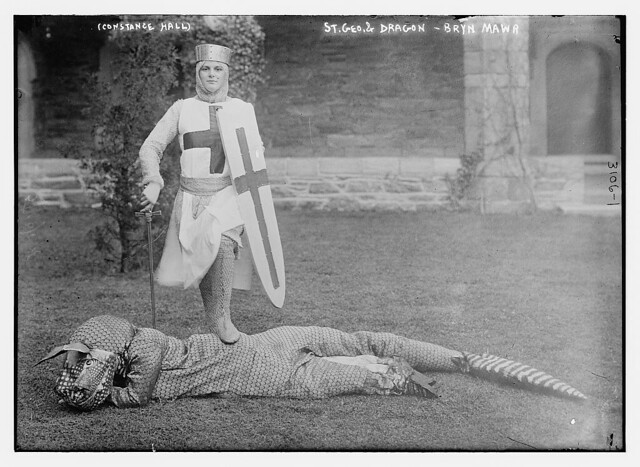 |
| St George and the Dragon, Bryn Mawr, c1910-1915 |
Mike mistakenly suggested that his only song to mention St George was one which he will sing next week for May Day, so he started off the session by commemorating the hundredth anniversary of the start of the Gallipoli Campaign with The Band Played Waltzing Matilda (Eric Bogle).
Derek followed that with A L Lloyd's version of Waltzing Matilda (Roud 9536). He said he thought that this version was associated with Queensland but wasn't sure. He challenged me to find out, so here are the results of my research. Sorry for the long extracts; if you aren't interested please just skip the indented section.
(mainlynorfolk) AL Lloyd sang Waltzing Matilda with Trevor Lucas and Martyn Wyndham-Read joining in the chorus on their 1971 album The Great Australian Legend. AL Lloyd wrote on the original album's backside: "Australia's 'unofficial' national anthem. Who made it? Banjo Paterson claims the words, written at Dagworth Station, near Winton, Queensland, in 1895. The most-used tune is variously credited to Mrs Marie Cowan, Miss Christina MacPherson (sister of Robert MacPherson, manager of Dagworth Station), and to Josephine Pene (some say a barmaid, some say a piano-teacher, not that the one rules the other out) also of Winton, who seems to have the strongest claim of all. The version here, in words and tune, runs a bit differently from the usual; it has been popularised by the poet and anthologist John Manifold, and it gives new life to an otherwise hackneyed song. By the way, on September 17, 1900, Miss Pene gave birth to a son, named Robert Dagworth McPherson Pene!".Phew! With that out of the way we can crack on with St George.
In the booklet accompanying the album he writes: "By way of overture, raising the curtain on our panorama and portrait, Australia's unofficial anthem, Waltzing Matilda, seems appropriate, with its presentation of the rootless, restless swagman, tramping the continent afoot because he's too poor to own a horse, 'leading a water-bag' instead (Australian humour is dry as the countryside), and humping his blanket-roll, his swag, his bluey, his Matilda. Some say the song epitomises the bushman's attitude to authority. Some go further and say that the sheep-stealing swagman is the culture hero of Australian nationalism. Perhaps that's pitching it rather high. Certainly, throughout the twentieth century, Waltzing Matilda seems to have been a powerful song for countryfolk and townsfolk too, and perhaps part of its charm is the curious mirage-like dreamy quality it shares with much of the Australian landscape.".
(Union Songs) This tune often called 'The Queensland Version' was collected by John Manifold from John O'Neill of Buderim. Manifold notes how much better this tune fits the words that Banjo Paterson wrote. Stewart and Keesing in Old Bush Songs note "The swagman is said to have drowned himself in the Combo waterhole in a billabong of the Diamantina River on the boundary of a station owned by the Macpherson family". The text first appeared in 'Saltbush Bill JP' [Banjo Paterson's third collection of poetry] printed in 1917. Frank Hardy regarded the song as a reflection of the revolutionary period (1891) of the great Shearers Strike, when armed and mounted shearers faced the weight of military and judicial crackdown. Waltzing Matilda was written by Paterson shortly after the strike.
Colin sang us a trio of songs contemplating whether or not virgins taste better to dragons than other types of prey (apparently they do). I have only traced the first of these three, which was Do Virgins Taste Better (Randy Farran).
Simon brought forth a Marriott Edgar monologue George and the Dragon, about an unfortunate carrier who has run out of petrol and an uncooperative pub landlady who will not help him fill his tank.
Mike's second song of the evening was close enough to the theme, being Hard Times Of Old England (Roud 1206), as was his third: Drink Old England Dry (Roud 882).
It was Derek who, with his next, took the title from Simon who on previous occasions had been the one to apparently scare off the non-folkies in the room. Sorry to all visiting non-folkies; we love you really. The song was Follow Me Up To Carlow, which we learnt to be a slip jig - a notoriously difficult time to follow. Maybe our visitors were simply perplexed by the rhythmic complexity of this tune?
Back on theme, Roger sang Ivor Novello's Rose Of England; possibly a strange topic for a Welsh composer?
Colin, having finished his treatise on the diet of the dragon race, produced a children's song about the same creature: St George and The Dragon. This was followed by Simon singing The Lambton Worm (Roud 2337 - Jack Leumane), with some help from Derek in remembering the tune for the verse.
In an attempt to do something on topic, Chris recalled an admirably large part of Alfred, Lord Tennyson's Morte D'Arthur. This inspired Simon to have a go at Pete Coe's The Wizard Of Alderley Edge. This joined another Pete Coe song (Streets of Rochester), with whose tune Derek returned to the previous Waltzing Matila theme.
Colin managed to still cling onto the evening's theme with his last song, which was Woad (William Hope-Jones).
Derek closed the evening with a version of Golden Vanity (Roud 122, Child 286). Derek actually sings "Golden Trinity". I don't know where that version comes from but I found mention of versions using "Sweet Trinity".
So next week it will be a May Day theme. I guess that could be old (possibly) English traditions, keeping the red flag flying or cries of distress. Whichever way it goes, come and join us "to welcome in the summer, to welcome in the May-O".
Here's a selection of the songs sung during this session.
(Number of people present - 12, of which 8 performed)
No comments:
Post a Comment